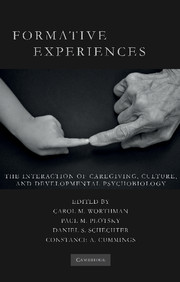Book contents
- Frontmatter
- Contents
- List of Figures
- List of Tables
- List of Contributors
- Foreword by Robert Sapolsky
- Preface
- List of Abbreviations
- Introduction
- SECTION ONE HISTORICAL, CROSS-CULTURAL, AND DEVELOPMENTAL SCIENCE PERSPECTIVES
- SECTION TWO HOW EXPERIENCE INTERACTS WITH BIOLOGICAL DEVELOPMENT
- SECTION THREE FORMATIVE RELATIONSHIPS WITHIN AND ACROSS GENERATIONS
- SECTION FOUR SOCIAL AND CULTURAL CONTEXTS OF CHILDHOOD DEVELOPMENT – NORMATIVE SETTINGS, PRACTICES, AND CONSEQUENCES
- 11 Ethnographic Case Study: Inuit Morality Play and the Danish Medical Officer
- Commentary
- Commentary
- 12 Ontogenetic Perspectives on the Neurobiological Basis of Psychopathology Following Abuse and Neglect
- 13 Ethnographic Case Study: Maria – Cultural Change and Posttraumatic Stress in the Life of a Belizean Adolescent Girl
- Commentary
- Commentary
- 14 Sex/Gender, Culture, and Development: Issues in the Emergence of Puberty and Attraction
- SECTION FIVE FEAR, FUN, AND THE BOUNDARIES OF SOCIAL EXPERIENCE
- SECTION SIX PUBLIC HEALTH, EDUCATION, AND POLICY IMPLICATIONS
- Index
- References
11 - Ethnographic Case Study: Inuit Morality Play and the Danish Medical Officer
Published online by Cambridge University Press: 26 May 2010
- Frontmatter
- Contents
- List of Figures
- List of Tables
- List of Contributors
- Foreword by Robert Sapolsky
- Preface
- List of Abbreviations
- Introduction
- SECTION ONE HISTORICAL, CROSS-CULTURAL, AND DEVELOPMENTAL SCIENCE PERSPECTIVES
- SECTION TWO HOW EXPERIENCE INTERACTS WITH BIOLOGICAL DEVELOPMENT
- SECTION THREE FORMATIVE RELATIONSHIPS WITHIN AND ACROSS GENERATIONS
- SECTION FOUR SOCIAL AND CULTURAL CONTEXTS OF CHILDHOOD DEVELOPMENT – NORMATIVE SETTINGS, PRACTICES, AND CONSEQUENCES
- 11 Ethnographic Case Study: Inuit Morality Play and the Danish Medical Officer
- Commentary
- Commentary
- 12 Ontogenetic Perspectives on the Neurobiological Basis of Psychopathology Following Abuse and Neglect
- 13 Ethnographic Case Study: Maria – Cultural Change and Posttraumatic Stress in the Life of a Belizean Adolescent Girl
- Commentary
- Commentary
- 14 Sex/Gender, Culture, and Development: Issues in the Emergence of Puberty and Attraction
- SECTION FIVE FEAR, FUN, AND THE BOUNDARIES OF SOCIAL EXPERIENCE
- SECTION SIX PUBLIC HEALTH, EDUCATION, AND POLICY IMPLICATIONS
- Index
- References
Summary
This case study was inspired – or perhaps provoked – by the Chief Medical Officer of Greenland, who told me after hearing me lecture that he thought all Inuit children ought to be removed from their parents for their own protection. Inuit, of course, consider our childrearing abusive, not theirs. By and large, Inuit love their children dearly, and in their own eyes, they treat them extremely benignly. They just create strengths and vulnerabilities that are different from the ones we create. I want to show you the morality in the kind of interaction that shocked the medical officer and how it is conveyed to the child.
Imagine the following scene: Aqnaqjuaq, a woman in her late 50s, comes into the home of her married daughter, Liila, to pay a late-evening visit. She is carrying Liila's youngest daughter, Aita, a baby less than a year old, whom Aqnaqjuaq has adopted. Liila tenderly holds Aita on her lap and feeds her bits of bread. Meanwhile, Liila's three-year-old daughter, Chubby Maata, now the youngest in the family, is sitting beside her mother, playing with an empty cigarette package. Nobody else is present. The women's affectionate attention focuses on Aita, who is crying, and they're trying to figure out why.
Suddenly, Aqnaqjuaq, without any reason that I can see, begins chanting over and over again to Chubby Maata, “Your father is very bad!” Her eyes are smiling, but her voice is vigorous and emphatic. Chubby Maata does not smile.
- Type
- Chapter
- Information
- Formative ExperiencesThe Interaction of Caregiving, Culture, and Developmental Psychobiology, pp. 284 - 292Publisher: Cambridge University PressPrint publication year: 2010
References
- 1
- Cited by



